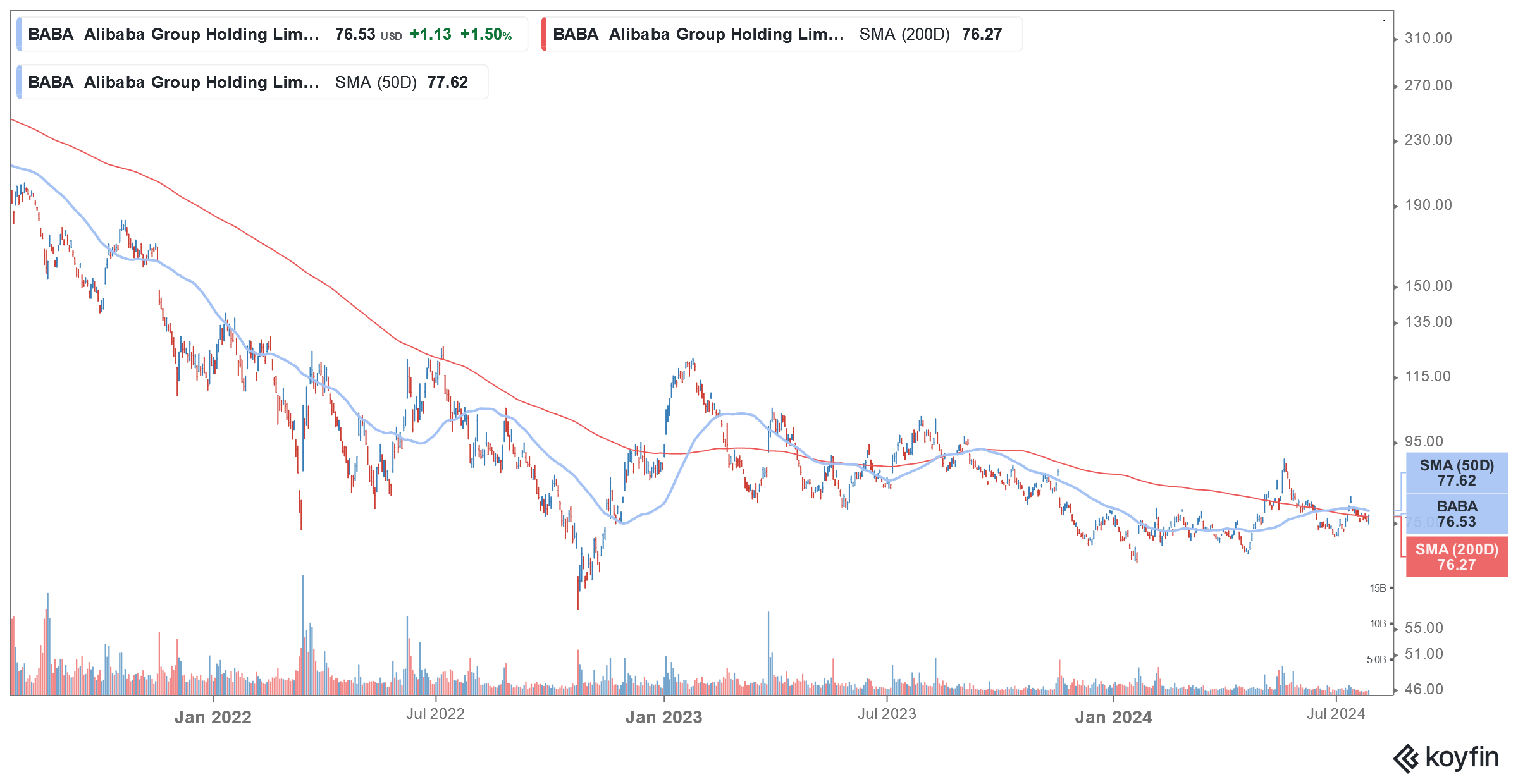Alibaba Stock Rises After Company Revises Merchant Fee and Refund Policy
Please note that we are not authorised to provide any investment advice. The content on this page is for information purposes only.
Alibaba (NYSE: BABA) shares are trading higher in US premarket price action today after reports of it starting to charge vendors a software service fee of 0.6% on confirmed transactions on both the Tmall and Taobao platforms. Separately, Taobao said that it would provide more autonomy in handling refund requests to merchants who have a strong track record.
Alibaba would do away with the fixed fee that it charged to the merchants and instead shift to the percentage-based fee. The company would join the ranks of other Chinese ecommerce platforms that have a similar structure.
Alibaba Revises Fee Structure For Merchants
For instance, since 2020 PDD Holdings, which owns the popular Temu ecommerce platforms, has been charging merchants a technical service fee ranging from 0.6%-1% of gross merchandise value. Following the trend, TikTok-owner ByteDance and JD.com also levied a 0.6% fee last year.
Markets view the changes as positive and Jefferies analysts led by Thomas Chong said in a note, “We view the 0.6% software service fees starting in September as positive to core merchant revenue considering the new arrangement applies to both Taobao and Tmall.”
The brokerage however maintained its buy rating and $116 target price on BABA stock.
BABA Stock Trades at a Fraction of Its 2020 Highs
While US tech stocks have hit new highs in 2024, Chinese tech stocks, especially Alibaba have sagged after peaking in 2020. That year, China cracked down on the company and Alibaba had to cancel the IPO of its subsidiary Ant Financial. The tech crackdown only worsened in 2021 and although Alibaba paid a record $2.8 billion fine to settle the antitrust case, markets were not too convinced that the worst is over for the company.
In March 2023, the Chinese tech giant announced a business restructuring and said that it would become a holding company while splitting into the following six business units – all of which have the ability to consider capital raising and separate listings.
However, the ambition took a hit due to US-China tensions, and in November last year Alibaba scrapped plans to list the cloud business, blaming the “uncertainties created by recent U.S. export restrictions on advanced computing chips.”
Notably, the US has banned the exports of high-end chips to China which might hamper the AI ambitions of Chinese tech companies.
Alibaba’s Growth Has Sagged
Alibaba’s growth has sagged and even as it initiated a dividend last year, it has failed to win over investors. The company’s fiscal Q4 2024 earnings also disappointed markets and the stock fell after the report. Its revenues rose 7% YoY to $30.7 billion and were ahead of analyst estimates. However, its operating income fell 3% over the period to $2.04 billion while the net income plunged 96% to $127 million. The key driver of the steep fall in profitability was the loss from its investments in publicly traded companies.
BABA’s Profits Plunged in Fiscal Q4
Looking at Alibaba’s different business segments, Taobao and Tmall Group reported a 4% YoY rise in revenues. The company is revamping the strategy of its Cloud Intelligence Group and said it is “focusing on high quality revenues from increasing public cloud adoption while reducing low-margin project-based contracts.”
The segment’s AI-related revenues grew in triple digits in the quarter. In its release, Alibaba said, “We expect the strong revenue growth in public cloud and AI-related products will offset the impact of the roll-off of project-based revenues.”
Hedge Funds Took Position in Alibaba Stock in Q1
Many US investors shunned Chinese tech stocks in 2021 after the country’s brutal tech crackdown. While the country has since sounded a more reconciliatory tone towards large tech companies, for many investors Chinese tech stocks are now uninvestable considering the policy uncertainty.
However, in Q1 2024, several hedge funds took a position in Alibaba amid the seemingly attractive valuation.
Billionaire investor David Tepper’s hedge fund Appaloosa Management, Saudi Arabia’s Public Investment Fund (PIF), and Michael Burry’s Scion Asset Management are some of the funds that increased their stake in Alibaba in Q1.
Alibaba is now the biggest holding for Appaloosa Management. Tepper also increased his fund’s stake in PDD Holdings and Baidu and along with Alibaba they make for three of the top 10 holdings.
Michael Burry Increased Stake in Alibaba
Burry of The Big Short fame also increased his stake in Chinese stocks. Its top holding at the end of Q1 was JD.com followed by Alibaba where the fund held around $9 million worth of shares. In 2023, Burry had sold all the Chinese shares that he was holding but now seems to be warming up again.
Similarly, PIF which is Saudi Arabia’s sovereign wealth fund increased its stake in Alibaba by 11% in Q1 making it among the biggest additions to the cash-rich fund in the quarter. Notably, PIF and its affiliates have been buying stakes in several overseas companies. The fund holds a stake in leading US companies like Uber and is the biggest shareholder of electric vehicle startup Lucid Motors.
It’s been almost a decade since Alibaba went public and the stock is only marginally higher than the IPO price of $68. Last year, it briefly fell below the IPO price amid the sell-off in Chinese stocks.
While the stock has recovered from those lows, it continues to underperform US tech peers and is up in low single digits in 2024 while US tech stocks are still up double digits in the year despite the recent sell-off.
BABA stock is meanwhile up 3% in US premarkets today after having previously risen nearly 5% in Hong Kong price action.






